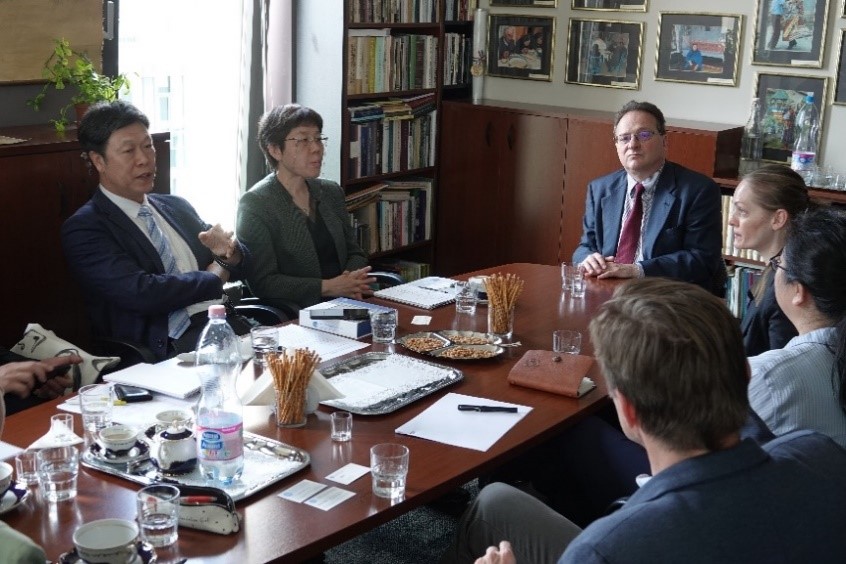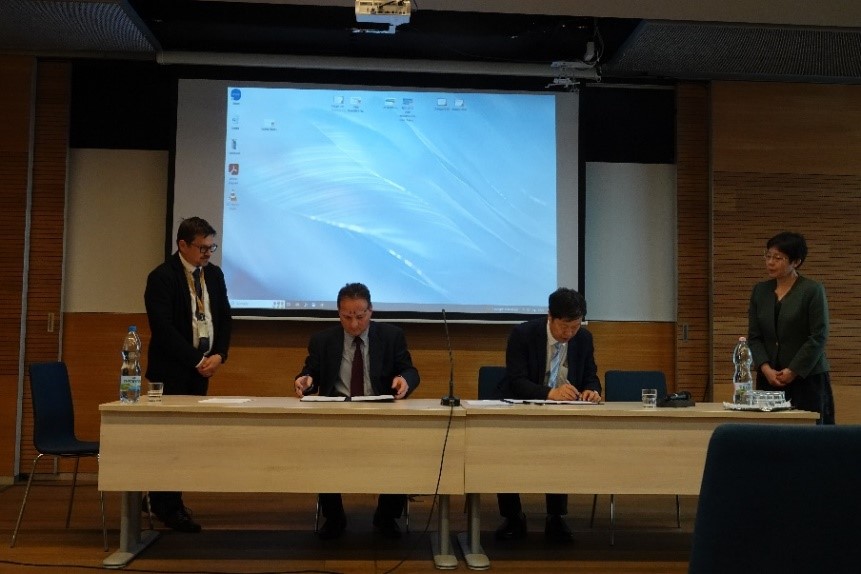On April 9th, Prof. CHEN Fahu, Chair of the Association for Trans-Eurasia Exchange and Silk Road Civilization Development (ATES), visited the Research Center for the Humanities of Hungarian Research Network (HUN-REN RCH) with a delegation from the Institute of Tibetan Plateau Research (ITP), Chinese Academy of Sciences (CAS), the Institute of Vertebrate Paleontology and Paleoanthropology (IVPP)/CAS, and the Secretariat of the Alliance of National and International Science Organizations for the Belt and Road Regions (ANSO).
The Memorandum of Understanding (MoU) between ATES and HUN-REN Research Center for the Humanities (RCH) was formally signed by Prof. CHEN Fahu and Prof. Balazs Balogh, Director General of RCH. Within this framework, both parties will focus on six research areas, including Paleolithic Culture and Human Migration, Trans-Eurasia Exchange of Early Farming and Herding, Evolution of Silk Road Network and Towns, Silk Road Science and Technology Exchange, Genetic History of Silk Road Populations, and Silk Road Civilization and Environment. This MoU aims to enhance cooperation between ATES and HUN-REN RCH through jointly supporting regional-based research activities, training and seminars, co-organizing scientific events, and facilitating scientist exchanges between the two organizations.
At the ATES-RCH joint workshop, Prof. CHEN Fahu delivered a keynote presentation on Environmental Changes and Trans-Eurasia Exchange. The President of the European Association of Archaeologists (EAA), Prof. Eszter Bánffy, introduced The Many Faces of the Neolithic Transition in Europe. Additionally, scientists from the HUN-REN Institute of Archaeology, Institute of Archaeogenomics, and Institute of Ethnology presented their research on various topics, including the movement of people and goods from Asia to the Carpathian Basin, the genetic history of the Altai region, and ethnobotanical and ethnozoological studies in the Carpathian Basin. Prof. HOU Juzhi from ITPCAS revealed the relationship between climate change and the rise and fall of the Tibetan Empire, while Prof. ZHANG Xiaoling from IVPP/CAS presented the peopling of the Tibetan Plateau hinterland. Dr. XIA Huan and Dr. ZHANG Shanjia from Lanzhou University delivered their online talks respectively. In the concluding remarks, both sides agreed to enhance academic interactions and scientific exchange in the future based on common interests and mutual benefits.
HUN-REN RCH was established in 2012 as a result of the reorganization of individual academic research institutes for human sciences, which takes up a leading position in the field in Hungary and Central Europe. It conducts essential research by international standards in the fields of philosophy, literary studies, art history, ethnography, archaeology, history, musicology, archaeogenomics, and classical philology. The nine institutes that constitute the HUN-REN RCH examine and interpret the entirety of the Hungarian past, reflecting on the challenges of the present.

HUN-REN RCH met Chinese Delegation

ATES signed Memorandum of Understanding with HUN-REN RCH

Joint Workshop of HUN-REN RCH and ATES


